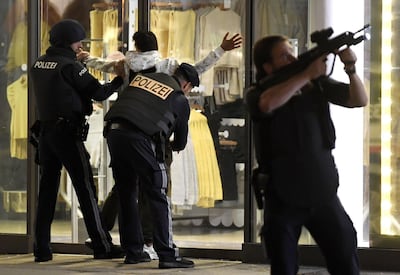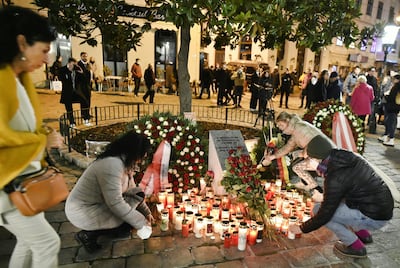Austrian intelligence agents should have raised the alarm about a known ISIS supporter before he killed four people in a 2020 terrorist attack in Vienna, an inquiry has found.
A counter-terrorism team failed to pass on evidence that Kujtim Fejzulai was seeking ammunition for an AK-47 rifle, its report said.
He opened fire with his AK-47 in Vienna’s city centre on November 4, 2020, in a nine-minute rampage that ended with his death in a shoot-out with police.
It was Austria’s worst terrorist attack in decades and led to questions about why Fejzulai, a dual national of Austria and North Macedonia, had not been stopped.
He was jailed in 2019 after trying to travel to Syria and spreading ISIS propaganda on social media, but was released on probation later that year.
In July 2020, his name surfaced again after Europol reported that two men had tried to buy ammunition from an arms dealer in Slovakia, but were refused because of missing paperwork.
The interior ministry later claimed there was only a “vague suspicion” that Fejzulai was one of the men seen in the blurry surveillance footage from Slovakia.
But the new report by an Austrian ombudsman said there was ample evidence for counter-terrorism specialists, who had dealt with Fejzulai before, to alert prosecutors.
“From a human perspective it is understandable that people now play down the significance of recognising Fejzulai in the blurry images, and describe it as a vague suspicion,” the report said.
“However, the facts laid out by the ombudsman’s office debunk this attempt to play it down.”

The report said there was also other evidence implicating Fejzulai in the attempted arms deal, including a car registration linked to a known associate’s mother.
The AK-47 is known to be a popular weapon among Islamist extremists because it is robust and easy to handle, it said.
However, authorities apparently took the view that if Fejzulai were plotting an attack, he would not be so brazen as to buy ammunition under his own name.
On October 16, Slovakian authorities reported that the arms dealer had identified Fejzulai as the man who tried to buy AK-47 ammunition from him in July.
At this point, Austrian officials stepped up their inquiries into Fejzulai, but they failed to alert prosecutors before he opened fire in Vienna on November 4.
The report said they should not have waited for the arms dealer’s word, when he was untrained in criminal investigations and they knew Fejzulai better than the salesman did.

There had also been intelligence reports that Fejzulai was resuming his efforts to travel to Syria, and had been seen at a gathering of extremists in Vienna in July 2020.
Despite these clues, the view was taken that Fejzulai was not suspected of any crime with which he could be charged.
The failure to alert prosecutors was “a case of maladministration with serious consequences”, the ombudsman’s report said.
The counter-terror unit was dissolved and replaced in the aftermath of the mass shooting.
Austria’s parliament also passed anti-terror measures in July 2021 aimed at stamping out “political Islam”, as ministers often call it.
It gave authorities new powers to shut mosques suspected of harbouring radicalism and cut off their financing from abroad.
The report is not the first to criticise European security agencies after terrorist attacks. The culprit in Berlin's 2016 Christmas market rampage was deemed not to be a threat despite extremist sympathies, an inquiry found.
The murder of British MP David Amess in October 2021 likewise led to questions about whether the controversial Prevent scheme was working.


